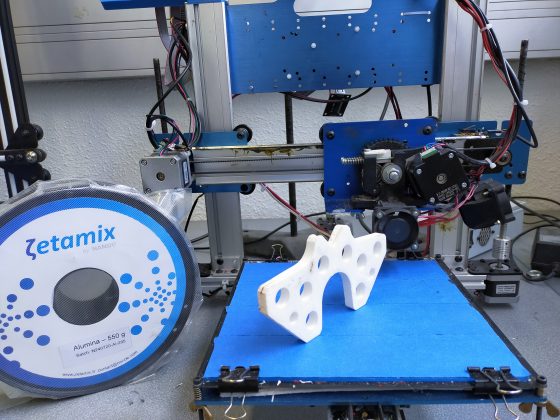Example at the Centre Des Matériaux (Evry, France) a MINES ParisTech – PSL research lab.
3D printing has demonstrated to be by far the greatest solution to produce on demand ceramic parts in small series. More and more laboratories and research centers equip themselves with Zetamix technology to fabricate a wide variety of parts, from heating cartridges to sample holders. Discover how the Mine Paris Tech, an education and research center, is using Zetamix filaments to improve the quality of their experiments.

The Centre des Matériaux is a unit of MINES ParisTech – PSL and is also a Joint Research Unit of the CNRS (UMR 7633 ) the CNRS, specialized in Materials Science and Mechanical Modeling with a particular attention to new materials obtained from innovative processes including those by AM. The aims of the studies are mainly focused on the influence of the fabrication processes on material properties as-produced or with aging conditions involving severe environnement.
Most of these studies require specific samples for specific environment such as high temperature, and regular sample holders do not allow to achieve these experiments. Thanks to Zetamix alumina filaments, Sylvain Gailliegue and Alain Koster, both experts in high-temperature mechancial testing easily solved these issues for different case studies .
Tensile test sample holder
In order to study the differences of properties between a metal made by melting foundry and one made by SLM (Selective Laser Melting), MINES ParisTech had to equip themself with highly customized sample holders for tensile test.
Indeed, producing a metal part by SLM is far from easy and needs a furnace post treatment : after the printing, tensile test specimens had to be annealed. However, Sylvain wanted to anneal several SLM samples in a tubular furnace simultaneously in order to save time, and make sure all the parts were heated with the same conditions. That brought a number of issues to be considered:
-The test samples are not allowed to touch each other in the tubular furnace
-They have to be placed in the center of the tubular furnace, where the temperature is homogeneous

Creation of unique and customized sample holder
MINES ParisTech is equipped with a high temperature biaxial testing machine. This machine aims to heat up a sample using an induction coil system and monitor the crack propagation when damaged in order to collect mechanical data to predict lifetime of materials. However, to lead a new experiment with high temperature and static conditions, Sylvain needed to only heat up a free-standing sample until damaging. This facility would be the best solution with only slight modification. Actually, when the sample reach the targeted temperature in the range of 800°C-1100°C , Sylvain has to maintain it in a very precise location on the machine.
Therefore, a specific sample holder is needed to achieve this goal. Moreover, this sample holder has to be resistant to high temperature and non-conductive for the inductive system. Thus, Sylvain decided to create a customized sample holder in a material which fills this two constraints : Alumina. Once again, alumina is an expensive material when it is product on small quantity, and Sylvain cannot afford to outsource the production of this sample holder. In the same way than for the previous sample holder, Sylvain printed an alumina part perfectly adapted to the machine thanks to Zetamix .

MINES Paris tech is equipped with 3D printers and furnaces to unbind and sinter printed parts. That is why using Zetamix filaments was particularly relevant to them: these filaments enable the laboratory to produce parts with their own machines and to significantly improve the quality of their experiments with few investment.